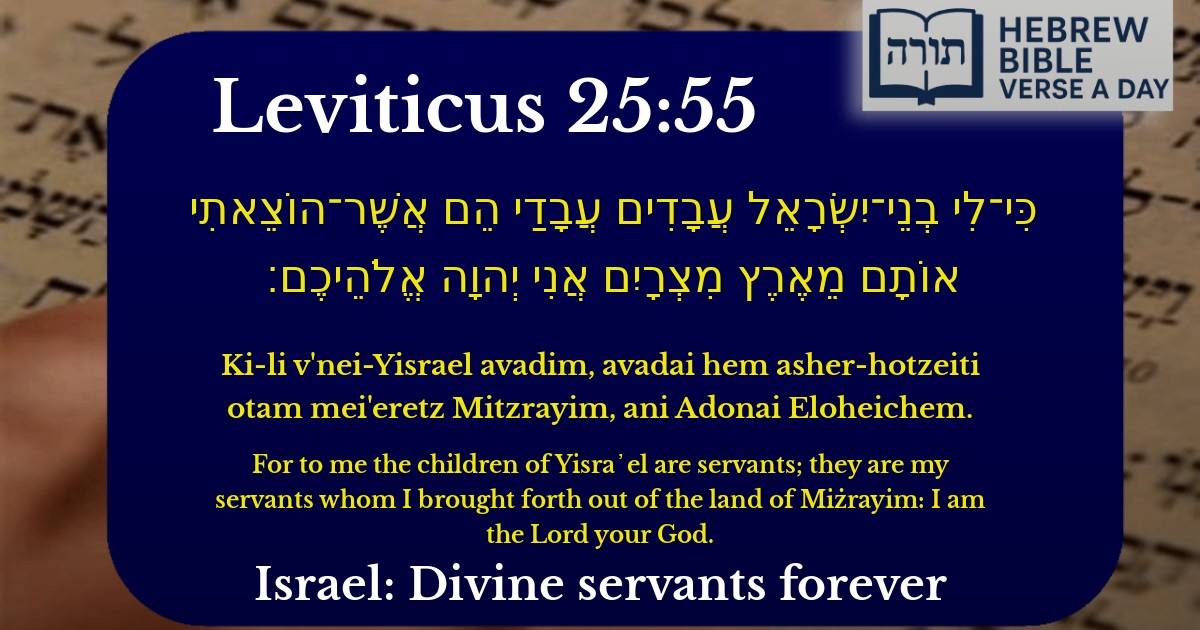Join Our Newsletter To Be Informed When New Videos Are Posted
Join the thousands of fellow Studends who rely on our videos to learn how to read the bible in Hebrew for free!
Hebrew Text
כִּי־לִי בְנֵי־יִשְׂרָאֵל עֲבָדִים עֲבָדַי הֵם אֲשֶׁר־הוֹצֵאתִי אוֹתָם מֵאֶרֶץ מִצְרָיִם אֲנִי יְהוָה אֱלֹהֵיכֶם׃
English Translation
For to me the children of Yisra᾽el are servants; they are my servants whom I brought forth out of the land of Miżrayim: I am the Lord your God.
Transliteration
Ki-li v'nei-Yisrael avadim, avadai hem asher-hotzeiti otam mei'eretz Mitzrayim, ani Adonai Eloheichem.
Hebrew Leining Text
כִּֽי־לִ֤י בְנֵֽי־יִשְׂרָאֵל֙ עֲבָדִ֔ים עֲבָדַ֣י הֵ֔ם אֲשֶׁר־הוֹצֵ֥אתִי אוֹתָ֖ם מֵאֶ֣רֶץ מִצְרָ֑יִם אֲנִ֖י יְהֹוָ֥ה אֱלֹהֵיכֶֽם׃
כִּֽי־לִ֤י בְנֵֽי־יִשְׂרָאֵל֙ עֲבָדִ֔ים עֲבָדַ֣י הֵ֔ם אֲשֶׁר־הוֹצֵ֥אתִי אוֹתָ֖ם מֵאֶ֣רֶץ מִצְרָ֑יִם אֲנִ֖י יְהֹוָ֥ה אֱלֹהֵיכֶֽם׃
🎵 Listen to leining
Parasha Commentary
📚 Talmud Citations
This verse is quoted in the Talmud.
📖 Bava Metzia 10a
The verse is cited in a discussion about the status of Jewish servants and the prohibition against treating them harshly, emphasizing that they are God's servants first.
📖 Kiddushin 22b
The verse is referenced in the context of discussing the laws of Jewish servitude, highlighting that Jews are ultimately servants of God and not to be treated as permanent slaves.


The Nature of Jewish Servitude to Hashem
The verse (Vayikra 25:55) emphasizes the unique relationship between Bnei Yisrael and Hashem, stating that they are His servants. Rashi explains that this servitude is not one of oppression but of privilege, as they were redeemed from Egypt specifically to serve Hashem. The Sforno adds that this servitude is eternal, distinguishing Jews from other nations who may serve human masters or idols.
Freedom Through Divine Service
Rambam (Hilchos Avodas Kochavim 1:3) teaches that true freedom is achieved only through service to Hashem. The Exodus from Egypt was not merely liberation from physical bondage but a transition to a higher purpose—accepting the yoke of Heaven. The Midrash (Shemos Rabbah 30:9) compares this to a slave freed by a king to serve the king himself, a far nobler station.
The Eternal Covenant
The phrase "I am the Lord your God" underscores the unbreakable bond. The Kli Yakar explains that Hashem’s ownership of Bnei Yisrael is rooted in His role as their Redeemer, creating an everlasting covenant. This idea is echoed in the Talmud (Kiddushin 22b), which states that a Jew who acquires a Hebrew servant is effectively acquiring a master, since both are ultimately servants of Hashem.
Key Lessons from the Verse